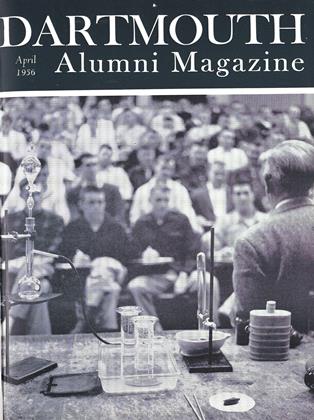A really beautiful book printed by Tom Beers' ('34) firm, the Lakeside Press, for Yale University Press is Mr. Franklin, which contains a selection of 27 of his personal letters. This is just to anticipate the 25-volume edition of Franklin which is now being prepared with the aid of a grant from Time, Inc. (first volume to appear in 1959). This book is handsomely illustrated and the letters are what you might expect from so wise an old codger as Benjamin Franklin. Sells for only $3.75.
While I am on Yale Press books I want to recommend also Eugene O'Neill's LongDay's Journey into Night, released, I believe, 23 years before O'Neill had intended when he finished the manuscript in 1941. It is autobiographical; the "haunted Tyrones" are the haunted O'Neills. The play has been written "with deep pity and understanding" and also "forgiveness" for the four haunted Tyrones: his father, mother, and brothers. As a play it is long; over four hours in the Stockholm premiere (wonderfully received); four unredeemed, harrowing hours, but nevertheless one of O'Neill's best plays. I read it at a sitting as I couldn't give it up until I had finished the tragic story of his family.
I also enjoyed reading the first volume of John Master's autobiography, Bugles anda Tiger (Viking). This is a story of a Sandhurst education, but mainly it deals with the pre-war Indian army. None of Izaak Walton's successors has ever told as many tall stories as Mr. Masters tells of his Gurkhas. However, the Gurkhas get their due and he describes them well, praising their short stature, their merry disposition, their "straightness, honesty, naturalness." Mr. Masters shrugs his shoulders tolerantly at their addiction to gambling, rum and women, and their tendency to be unkempt in the home.
I think members of the Dartmouth administration might find the story of Mr. Masters' life at Sandhurst revealing.
Mr. Truman's second volume is out, full of highly inflammable material. Years ofTrial and Hope, 1946-1952, I agree with Sir Arnold Lunn, will prove to be one of the important books of our time, indispensable alike to historian and well-informed American. Mr. Truman airs his troubles with General MacArthur, who can do no wrong in the eyes of his passionate followers. But most will agree, I think, that when the civilian authority has to be ranked by the military, then we are in for a bad time indeed. Men on horseback are safer if they remain on horseback. Unpretentious in every way, Harry Truman's memoirs are part of the record of our time, and a most important part.
Speaking of memoirs, an English friend has decided that three of the greatest of English autobiographies are Gibbon's, John Stuart Mill's (available in the Oxford World's Classics), and most recently AnAutobiography by Sir Arthur Keith, who died in January 1955, full of honors and years. I was fortunate enough to buy this book when it appeared (Watts & Company, London, 1950) and enjoyed it then, as I have in a re-reading. Sir Arthur had a retentive memory, and his book is made especially valuable as a record of a great scientific career because he kept a very full diary and writes always with an engaging frankness. The details of his life are all minutely set down from his early days in Aberdeen to the congenial close as Master of the Buckstone Browne Farm, at Downe, in Kent, near Darwin's house, which he was the means of saving for the nation.
There is a Dreiser revival. If you want to re-read him I suggest you return to Jennie Gerhardt (a much more sincere book, by the way, than Moore's EstherWaters); Sister Carrie; The Financier, with the immortal Cowperwood; and last, and far from least, The American Tragedy, the story which modeled itself on the life and death (in the electric chair) of the American Clyde Griffiths. Even if Dreiser is an uncouth and atrocious writer at times, he is only now coming into his own. As an English critic puts it: "He was a far more significant American writer than some who have become world-famous since his day."
As I have reviewed All Honorable Men by David Karp in The Times, and over the radio, I will merely say here that I recommend it as a serious study of security-minded bullying done in the name of patriotism. The "honorable men" are those who subsidize evil and hatred, who turn our life into a jungle, who revive the spirit of the Inquisition, and who are representatives of what Mr. Karp, the author, calls "swollen, pot-bellied patriotism." Knopf is the publisher.
My friend Gregory Mason has written an Orwellian fantasy: The Golden Archer (Twayne) which anticipates life in this country in 1975. Daring and amusing; penetrating and courageous. Will arouse controversy if it is reviewed.
 View Full Issue
View Full Issue
More From This Issue
-
 Feature
FeatureThe Hopkins Center Concept
April 1956 -
 Feature
FeatureTHE MOCK-DUEL MURDER
April 1956 By EDWARD CONNERY LATHEM '51 -
 Feature
FeatureELECTION-YEAR CONFERENCE
April 1956 By ROBERT H. GILE '56 -
 Feature
FeatureA Tuckerman Tradition
April 1956 By ROBERT S. MONAHAN '29 -
 Class Notes
Class Notes1918
April 1956 By ERNEST H. EARLEY, RICHARD A. HOLTON -
 Class Notes
Class Notes1929
April 1956 By CHRISTIAN E. BORN, JOHN W. MOXON
HERBERT F. WEST '22
-
 Article
ArticleHanover Browsing
November 1942 By HERBERT F. WEST '22 -
 Books
BooksTHE ROAD BACK TO PARIS
March 1944 By Herbert F. West '22 -
 Article
ArticleHanover Browsing
October 1946 By HERBERT F. WEST '22 -
 Books
BooksA GUIDE TO TROLLOPE
October 1948 By Herbert F. West '22 -
 Article
ArticleHanover Browsing
February 1950 By HERBERT F. WEST '22 -
 Article
ArticleHanover Browsing
March 1957 By HERBERT F. WEST '22








